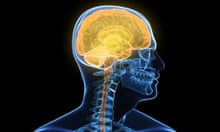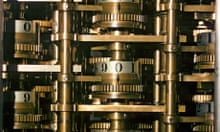The quesiton: Why can't computers think?
The notion that computers can think, or that one day they will do so, is rooted in one of two complementary misunderstandings. The first relates to the nature of computers and the second to the nature of thought. That these misunderstandings have had such a powerful hold on the minds of many otherwise intelligent people is due to a tendency to take useful metaphors – describing what computers do and how they do it – as literal truth.
Consider, first, misunderstanding about the nature of computers. Most people would agree that the computers we have at present are not conscious: the latest Super-Cray with gigabytes of memory is no less zomboid than a pocket calculator. But there is the feeling that at some stage, as a result of increasing computational power and in something called "complexity", the artefact that possesses this power and this complexity will wake up to its own existence, or at the very least, experience the transactions which take place in, through, and around it.
We should treat this claim with extreme scepticism because those who say that conscious computers are around the corner are not able to specify what features conscious computers will have in addition to those possessed by our current unconscious ones. There was a fashion in the 1980s and 1990s for invoking alternative architectures – in particular parallel rather than serial processing – as the basis for computers that would be aware of themselves. This fashion has now passed and the conceptual cupboard of the conscious-computers-round-the-corner brigade is now empty. We therefore have no reason for expecting that computers will be anything other than extremely complex devices in which unconscious electrical impulses pass into and out of unconscious electrical circuits and interact with any number of devices connected directly or indirectly to them.
As for thought, this has been even more profoundly misunderstood. Some have argued that thought does not require consciousness, so that computers can think, or will one day think, even though they will never be conscious. Thoughts, like other so-called conscious activities, are merely causal way-stations between inputs such as sense experience and outputs such as behaviour. They do not have to be conscious; indeed, consciousness contributes nothing to their causal efficacy. It requires no equipment or subtle argument to demonstrate that this is nonsense. All you need is to focus on the thoughts you are having now. To deny that thought is conscious is self-refuting: you cannot deny the consciousness of your thoughts without being conscious of doing so. And to claim that conscious thought, or indeed consciousness, has a central role in our lives belongs to an extreme behaviourism that is not able to explain even ordinary human behaviour.
So an unconscious computer cannot be said to be thinking. It may assist us to think but is not itself thoughtful. Just as a clock may help us to tell the time, but does not of itself tell the time. Of course, we can achieve many things without thought; and unthinking computers can be enormously effective in increasing our ability to act upon the world. Thought is unnecessary for the operation of (very powerful) computers and there is nothing intrinsically thoughtful about computational activity. This, however, only highlights the difference between the latter and consciousness. There are many ways in which consciousness, and in particular thoughtful consciousness, is not computational. Here is one: when we think about something, our thoughts draw upon an unrestricted domain of awareness, though we ourselves may attempt to restrict it: that is called "concentration". The effortful "I" that tries to work out how to get to London by the quickest and the most pleasant and convenient route has nothing in common with the journey planner software that has this as its sole function and has no idea of what it is doing or why and what you are doing or why.
None of this should need to be spelled out. So how did the notion arise that computers may "one day" be conscious thinkers and that consciousness, especially thoughtful consciousness, is computational? The answer lies in the language we use to describe computers, our minds, and our brains. As Wittgenstein said in his posthumous Philosophical Investigations: "A picture held us captive. And we could not get out of it for it lay in our language and language seemed to repeat it to us inexorably." The key to understanding the delusions about computers and consciousness is to see the misuse of the word "information". Computers, minds and brains are, we are told, all in the same business, namely processing information. The mind is simply software implemented on the hardware (or "wetware") that is the brain. What seems to escape notice is that the word "information" has a different meaning in different contexts and that the computational meaning of information, as Warren Weaver, one of the great founding fathers of information theory pointed out, has little to do with the word as it is used in everyday life. It should not be confused with ordinary usage, which refers to knowledge consciously communicated between conscious human beings.
Shannon's wise – and prescient – words have been ignored. The intellectual consequences have been dire. We learn that there is "information" in the material world – for example in the light that lands on the retina; that sensory experience is information (so that sunbathing is really information bathing); and that bits of the brain "inform" other bits of the brain and that the mind/brain is an information processor. The very muddle that Shannon warned against has enabled mental activity, such as thought, to be separated from consciousness in the minds of some of the most prominent thinkers of the day. Thus it is possible to entertain the daft notion that a computer, the unconscious assistant of conscious human beings, can do conscious things like thinking – or will do one day.
Grr!





